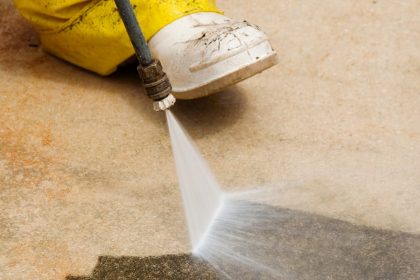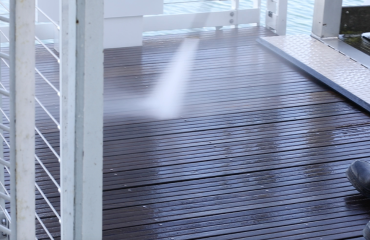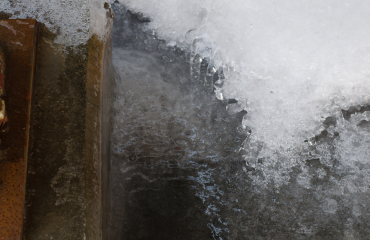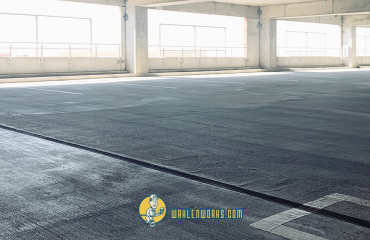
DIY pressure washing is quite the fad. Lots of people think they can tell you how to safely use a pressure washer to clean your property. After all, you’re spraying water. How hard can it be? Not hard at all according to HGTV and DIY Network. “The process only requires a few tools”, they say. “You can purchase a pressure washer at nearly any hardware store or rent one from a local tool rental shop”, they insist. “Erase years of wear and tear from your driveway in just a few simple steps”, they promise. Be skeptical, we advise.
It Looks Easier Than It Is
Pressure washing is one of those things that looks much easier than it actually is. Without experience or someone to show you what to do, you won’t be certain of the outcome of your first efforts with the pressure washer. When you operate a pressure washer incorrectly, you run the risk of property damage, physical injury, and environmental pollution. If you use too much pressure for too long in a small area, you will have etched concrete. If you don’t know what safety precautions to take or if you give into the temptation to take safety shortcuts, you can end up in the emergency room. Indiscriminate, unplanned washing can send pollutants into the municipal water system or your carefully tended garden.
Even people who have experience with professional power washing equipment are tired and dirty at the end of the job. When you consider the expenses of DIY pressure washing — machine rental, cleaning supplies, potential damage repair — and the amount of time the work will take, you have to consider the return on investment. It’s especially tempting for small business owners with modestly-sized properties to think that they can save some money by going the DIY route. But, wouldn’t the time you spend learning pressure washing the hard way be better spent investing in the business you own — the place where you are an expert?
At Wahlen Works, we are experts in pressure washing so we do have a dog in this hunt. We think you are going to be happier and better off if you hire us to do your pressure washing rather than doing it yourself. And we are not the only ones who urge potential novice pressure washers to be cautious. Glenn Hegge of the “Handyman Show” says, “While a power washer often is the tool of choice for driveways, decks and siding, you have heard me caution about using a power washer for certain projects, because the water pressure these units create can damage the things you are trying to make look good.”
Pressure Washing Pitfalls
We have observed five common areas where inexperienced pressure washing gets people into trouble. Each one provides a good reason not to undertake DIY power washing.
- Using too much pressure. Water pressure is measured in pounds per square inch (psi). The water pressure of a typical garden hose is about 40 psi, while a gas-powered pressure washer dispenses water at between 2000 to 2800 psi (source: consumer reports). This is enough pressure to splinter wood, dent automobiles, and etch concrete. Without experience, it’s easy to cause damage that is expensive to fix.
- Working inefficiently. Most 1950’s housewives would tell you that it’s best to clean top to bottom and back to front. They would probably also tell you to soak tough stains and air dry your sheets. The same principles apply to pressure washing. However, if you aren’t accustomed to this mindset, you might not think to pre-treat grease stains until they didn’t get clean the first time.
- Not using the correct products. Speaking of pre-treating, do you know which solutions to use? Or which detergents to add to the water? Or that you need to add cleaning solutions to the water at all? If not, don’t feel bad. Most people don’t. This is where a professional can save time and money by doing the job right the first time. In addition, they know how to keep harmful chemicals out of the sewer system and out of your landscaping.
- Not using the correct equipment. There are many different types of pressure washers available for rent and for purchase. Generally speaking, electric units have a lower psi and gas units have a higher psi. Beyond that, it takes some time to research and decide which machine you need. Or you can take the word of the salesperson. All of these things take time and have a learning curve.
- Failing to take proper safety precautions. If your pressure washer can etch concrete, what do you think it will do to your Nike’s? You need the right protective equipment which includes sturdy shoes, protective eyewear, and gloves. If you are using a gas powered machine you shouldn’t operate it in an enclosed space. If you are using an electric machine you need to remember that water is an excellent conductor of electricity. In other words, if you’ve never operated a pressure washer before, there’s a lot to learn. Most of it is probably in the manual, but how much of that will you realistically read?
Properly maintained hardscapes add value to your property and speak well of your business. And yet, your time is most valuable when it’s invested in what matters most to you. Instead of spending your Saturday learning how to use a pressure washer, be a DIY outdoorsman and let the facilities professionals keep your facility clean.



